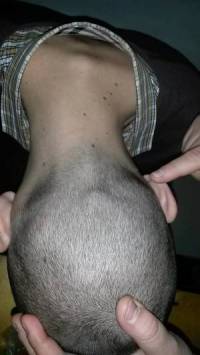Torture as usual at Kyiv police station?

Bitter déjà vu as the police of a Kyiv police station are accused of beating up an underage activist, keeping him in custody for what they claim was an attempt to destroy a Roshen chocolates kiosk, and long denying him access to a lawyer
Well-known journalist and recently elected MP, Ihor Lutsenko has accused the police at Kyiv’s Svyatoshynsk Police Station of beating a minor detained and refusing him access to a lawyer.
Lutsenko reports that he arrived at the police station after learning from Facebook that an underage lad had been beaten and that a lawyer was not being allowed in to see him. He was stopped from entering the building after asking to speak to those in charge and the officer at the door began ringing somebody, and also sending all police officers who tried to leave in another direction. Lutsenko assumes he was telling them to go out from the back entrance.
After about 10 minutes he was issued into the area controlled by security where he was made to wait until an officer came and gave him a telephone, saying that one of the people in charge was on the line. Lutsenko refused to speak on the telephone and was finally admitted.
After yet another 15 minute wait an investigator arrived and claimed to not know whether ‘the suspect’ was at the station or not. Lutsenko suggested that they look together. The investigator then went off to his office on the top floor with Lutsenko effectively in pursuit insisting on knowing where the young man was.
Lutsenko reports that a group of young men turned up together with lawyer Viktor Smaliy. The latter sat on the floor and refused to budge until allowed to see the young detainee or until he was shown the journal indicating that he had been taken to a temporary holding facility [ITT].
The officer refused to show either Smaliy or Lutsenko the journal. In the meantime, the staff of the station all gathered, watching the two and the young men behind them.
Another police officer quietly walked up to Lutsenko and offered a deal: he and Smaliy would be allowed in to see the lad – who lo and behold turned out to be in the station after all - if the young men left the station.
The photos here were posted by Lutsenko who points to bruises, signs that they tried to suffocate him and the marks from handcuffs. Smaliy gives more details of the same injuries which he calls torture, and also accuses the police of falsifying the procedural documentation. This would, of course, explain the unwillingness to show the journal. Police have long avoided recording the actual time of detention and / or of being brought to a police station with detainees therefore officially not existing and remaining under the total control of the police officers.
From reports it seems that the detained lad is 17-year-old Yevhen Hurin. The young men who turned up at the station together with Smaliy say that they were planning a protest action outside a Roshen kiosk near the Zhytomirska Metro. Roshen remains President Petro Poroshenko’s chocolate firm. The activists assert that they only wanted to hang a banner asking: “How do you like the blood of anti-terrorist operation fighters?”, referring to Poroshenko’s business in Russia.The police on the other hand claim that the lad was detained trying to break a window of the kiosk and accused him of deliberate destruction of property.
He remains in custody though has been allowed to see a lawyer (Smaliy).
Despite his age and the allegations, backed by photos, that he was beaten by the police, Lutsenko’s attempt to get the city procurator Serhiy Yuldashev to react were unsuccessful. Lutsenko suggests that Yuldashev appears to believe that the police have the right to use such means when detaining (or ‘interrogating’) suspects.
They do not.
Bitter déjà vu
Lutsenko has cause to feel that he has seen – and experienced – all of this before. So too does Smaliy.
A year ago Smaliy was in detention, arrested and charged with ‘attempted murder’ while defending a journalist colleague from Road Control, Andriy Dzyndzya, who was facing clearly politically motivated charges linked with EuroMaidan protests (more details here).
Ihor Lutsenko had been savagely beaten after being abducted, together with Yury Verbytsky, whom he had taken to hospital. Both men were seized during the early hours of Jan 21 by up to 10 men in plain clothes.
Lutsenko was also a prominent EuroMaidan activist and his abduction prompted outcry, including from outside Ukraine. This probably saved his life – he was found the next day, badly beaten but alive. Lutsenko stated then that he was convinced that the treatment he and Verbytsky had received was part of a standard pattern with people being interrogated and badly beaten outside the city and then taken to police stations. The interrogation was about Maidan, what plans there were and who was controlling ‘Right Sector’.
Yury Verbytsky was a 51-year-old seismologist from Lviv and had been beaten even more savagely when the abductors learned that he was from western Ukraine. His badly mutilated body was found in a forest outside Kyiv on Jan 23 (see Yury Verbytsky sustained horrific injuries).
As well as the ongoing failure to properly investigate the killings and other crimes committed during EuroMaidan, there remains virtually no progress over the reinvestigation into the death in police custody of student Ihor Indylo. There seems to be no investigation at all into the death in police custody of 19-year-old orphan Dmytro Pozdeev.
Small wonder that Lutsenko says it feels like ex-President Viktor Yanukovych never fled.





